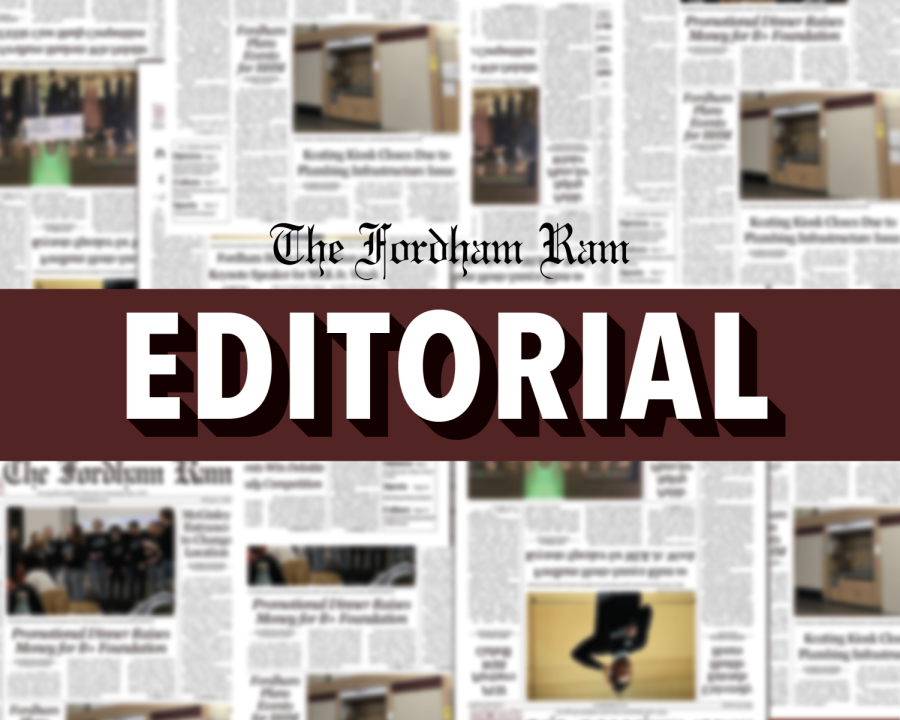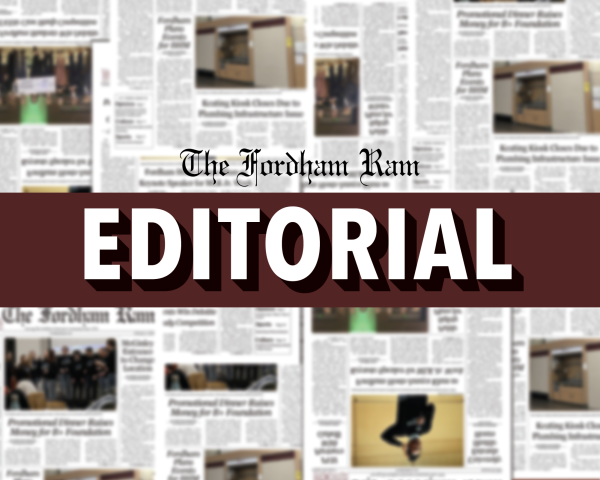USG Must Prioritize Transparency
On Monday, April 11, The Fordham Ram published the article “USG Fails to Disclose Sanctions Against Candidates.” The article revealed that Rose Hill’s United Student Government (USG) did not disclose sanctions that were placed on candidates last election cycle, and that it is USG’s policy not to disclose to voters when candidates are sanctioned. The Ram’s editorial board does not support this policy, as voters deserve to have full transparency when casting their votes. During the week leading up to the election, the Ram closely watched the USG proceedings — the USG columnist Shannon Huurman attended the weekly meeting on March 31, the Ram moderated the Meet the Candidates event on April 6 and 7 and numerous USG members were interviewed — and it became clear to us at the Ram that these sanctions were an open secret in USG. In the USG weekly meeting on March 31, there was a reference to “last April’s scandal regarding election misconduct,” but no further information was revealed. The “scandal” was also subtly referenced at the event on April 7.
This discovery of USG’s policy of keeping sanctions private was incredibly troubling to us as voters. If the USG Election Commission felt certain candidates deserved to be penalized for their actions, we believe voters should have access to those records in order to inform their votes. The USG Election code claims that actions deemed damaging enough to place sanctions on have significant negative impacts on the election as a whole. To make an informed vote, it’s necessary for USG to disclose this kind of information about the candidates.
USG is supposed to act as an advocate for Fordham students. How can we trust them to do that for us if they are hiding crucial information from voters who are trying to decide who will best represent them? USG prides itself on being the voice of the student body, but it is impossible for it to accurately speak for and represent the whole student body, the voters when it is keeping the results of important procedures behind closed doors.
If USG had simply been transparent with voters last year about the candidates who had been sanctioned, the information would not seem so pertinent this election cycle. Candidates would have had the opportunity to publicly acknowledge the sanctions without being subjected to rumors and speculation from both within USG and the wider student body in both last year and this year’s election cycles.
While reading the USG bylaws, Election Code and looking into the process for the 2022 election, other problems with the USG election process have come to light. First, the amount of time the polls are open is less than two full days. We at the Ram do not believe this is an adequate amount of time for students to cast their votes, especially considering the polls have opened the week of Easter break when many students are going out of town.
Additionally, USG did not send any emails to students about the upcoming election other than an email on March 21, which explained how to run for a position in USG. This was the first and only email containing election dates sent by USG prior to the opening of the short voting period, limiting the time voters had to research the candidates. On the day the polls opened, USG did not send out an email informing students that voting was open until the afternoon, even though the polls opened at 9 a.m. and it never publicized that fact through the USG or Election Commission Instagram accounts, further limiting the voting time for students who were unaware of the upcoming election. The short voting period and lack of advertisement for the election make it difficult for students who are not involved in, related to or “in the know” about USG proceedings to participate in the election of our representatives.
Finally, the penalties associated with sanctions in the election code are incomparable to the types of violations detailed. In the Election Code, a major infraction is described as having a “significant material impact on the Election and causes severe harm to the integrity of the election.” The Election Code then details the penalties for major infractions which include a fine of up to 25% of the total allotment and suspending a candidate from campaigning for a period of time no less than 12 hours and no more than 24 hours. These penalties are a slap on the wrist for the types of infractions that fall under the major infraction category in the Election Code, a category that is reserved for infractions that have a significant impact on the integrity of the election. If the Election Commission then hides the fact of who was even sanctioned from voters, there is really nothing of substance stopping candidates from acting in ways that compromise the integrity of the election, as it is unlikely the number of votes they will receive will be significantly affected by minor budget or campaigning sanctions.
Since the publication of the article “USG Fails to Disclose Sanctions Against Candidates,” the Ram has received several complaints that we did not release the names of those who were sanctioned. We would like to address those concerns by saying that we are still looking into this issue and will continue to update our readers as we find and confirm new information. Due to the secretive nature of the Election Committee’s sanction process, it is extremely difficult to verify who was sanctioned in last year’s election cycle. We at the Ram are committed to accurate reporting and will not publish any information unless we have thoroughly and adequately confirmed it. Our goal is to shed light on the problematic nature of the USG election process. In the USG constitution, it states: “USG shall be the voice of the student body of Fordham College at Rose Hill (FCRH) and the Gabelli School of Business (GSB) through elected Student Representatives in all University affairs.”
In order to be the voice of the student body, as USG says it is, the election process must change to be more transparent and inclusive to the student body.











































































































































































































